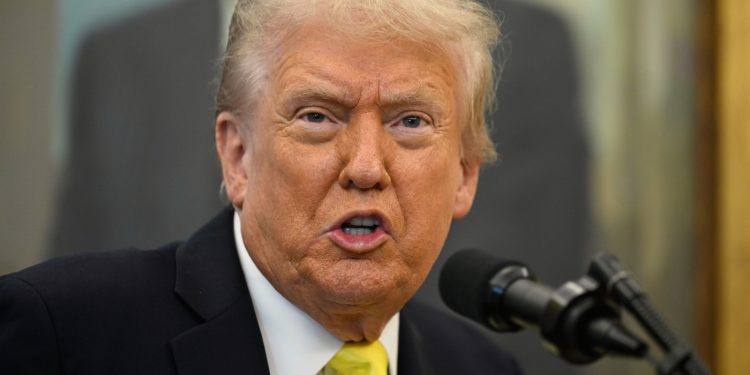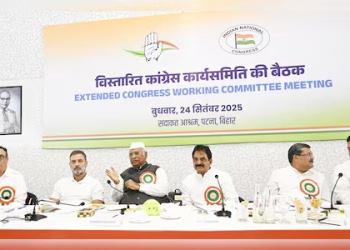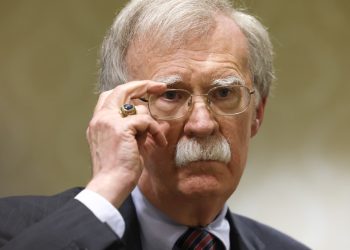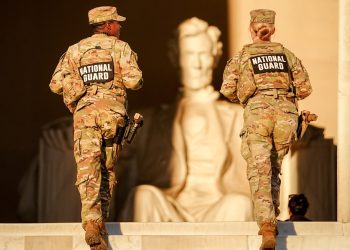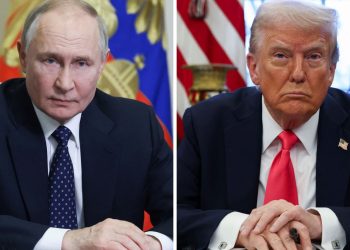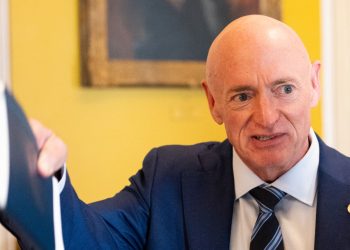President Donald Trump speaks during an event in the Oval Office of the White House on Wednesday in Washington.
John McDonnell/AP
hide caption
toggle caption
John McDonnell/AP
WASHINGTON — President Donald Trump confirmed Wednesday that he has authorized the CIA to conduct covert operations inside Venezuela and said he plans to conduct ground operations in the country.

The recognition of covert action in Venezuela by the US intelligence agency comes after the US military in recent weeks carried out a series of deadly strikes against suspected drug trafficking boats in the Caribbean. U.S. forces have destroyed at least five boats since early September, killing 27 people, and four of those ships came from Venezuela.
When asked Wednesday at an Oval Office event why he authorized the CIA to intervene in Venezuela, Trump said he made that decision.
“Actually, I authorized it for two reasons,” Trump responded. “No. 1, they emptied their prisons to the United States of America,” he said. “And the other thing, drugs, we have a lot of drugs coming from Venezuela, and a lot of Venezuelan drugs are coming by sea.”
Trump added that the administration is “studying the land issue” as it considers further strikes in the region. He declined to say whether the CIA had the authority to take action against President Nicolas Maduro.
Trump made the unusual acknowledgment of a CIA operation shortly after The New York Times published that the CIA had been authorized to carry out covert actions in Venezuela.
Maduro pushes back
On Wednesday, Maduro blasted the U.S. spy agency’s record in various conflicts around the world, without directly addressing Trump’s comments about allowing the CIA to conduct covert operations in Venezuela.
“No to regime change that reminds us so much of the (overthrows) during the failed eternal wars in Afghanistan, Iraq, Libya, etc.,” Maduro said during a televised event of the National Council for Sovereignty and Peace, made up of representatives from various political, economic, academic and cultural sectors of Venezuela.
“No to the coups carried out by the CIA, which remind us so much of the 30,000 who disappeared”, a figure estimated by human rights organizations such as the Mothers of the Plaza de Mayo during the military dictatorship in Argentina (1976-1983). He also discussed the 1973 coup in Chile.
“How long will the CIA continue its coups? Latin America does not want them, does not need them and rejects them,” Maduro added.
The goal is to “say no to war in the Caribbean, no to war in South America, yes to peace,” he said.

Speaking in English, Maduro said: “Not war, yes peace, not war. Is that how you would say it? Who speaks English? Not war, yes peace, the people of the United States, please. Please, please, please.”
In a statement, the Venezuelan Foreign Ministry on Wednesday rejected “the bellicose and extravagant statements of the President of the United States, in which he publicly admits to having authorized operations aimed at acting against the peace and stability of Venezuela.”
“This unprecedented statement constitutes a very serious violation of international law and the Charter of the United Nations and obliges the community of countries to denounce these manifestly immoderate and inconceivable statements,” said the statement published by Foreign Minister Yván Gil on his Telegram channel.
Congressional resistance
Earlier this month, the Trump administration declared drug cartels illegal combatants and said the United States was now engaged in “armed conflict” with them, justifying military action as a necessary escalation to stem the flow of drugs into the United States.
The move angered members of both major political parties in Congress because Trump was effectively committing an act of war without seeking authorization from Congress.
On Wednesday, Sen. Jeanne Shaheen, the ranking Democrat on the Senate Foreign Relations Committee, said that while she supported cracking down on trafficking, the administration had gone too far.
“The Trump administration has authorized covert CIA action, conducted deadly ship strikes and hinted at ground operations in Venezuela, bringing the United States closer to outright conflict, with no transparency, oversight or apparent safeguards,” Shaheen said. “The American people deserve to know whether the administration is dragging the United States into another conflict, endangering the military, or pursuing a regime change operation.”
The Trump administration has yet to provide lawmakers with underlying evidence that proves the boats targeted by the U.S. military were actually carrying narcotics, according to two U.S. officials familiar with the matter.
The officials, who were not authorized to comment publicly and spoke on condition of anonymity, said the administration had only pointed to unclassified video clips of the strikes posted on social media by Trump and Defense Secretary Pete Hegseth and had not yet produced “concrete evidence” that the ships were carrying drugs.

Lawmakers expressed frustration that the administration is giving few details about how it decided the United States was in armed conflict with cartels or which criminal organizations it claims are “unlawful combatants.”
Even as the U.S. military conducted strikes on some vessels, the U.S. Coast Guard continued its usual practice of stopping boats and seizing drugs.
Trump explained the action Wednesday, saying the traditional approach had not worked.
“Because we’ve been doing this for 30 years, and it’s been totally ineffective. They have faster boats,” he said. “They are world-class speedboats, but they are not faster than missiles.”
Human rights groups have expressed concerns that the strikes flout international law and constitute extrajudicial killings.


